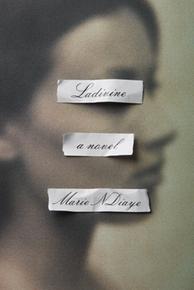
 On the first page of Ladivine by French novelist Marie NDiaye (Three Strong Women), readers meet a woman who is and is not named Clarisse Rivière. She grew up as Malinka, the daughter of a black West African single mother, Ladivine Sylla, and an unknown white man. Raised as "the princess" by her devoted, isolated mother, "the servant," Malinka realized early on that she could pass as white. She fled home, made a new life as the "resolutely inoffensive" Clarisse, married white Richard Rivière, and kept him and her mother secret from each other all her life. Like her mother, she devotes herself entirely to her family, but "her voluntary, permanent self-effacement had constructed a thin wall of ice all around her, that sometimes her daughter and husband couldn't understand," and in time she loses them too. Alone, she becomes Malinka again for a short time, with an accepting but dangerously broken lover.
On the first page of Ladivine by French novelist Marie NDiaye (Three Strong Women), readers meet a woman who is and is not named Clarisse Rivière. She grew up as Malinka, the daughter of a black West African single mother, Ladivine Sylla, and an unknown white man. Raised as "the princess" by her devoted, isolated mother, "the servant," Malinka realized early on that she could pass as white. She fled home, made a new life as the "resolutely inoffensive" Clarisse, married white Richard Rivière, and kept him and her mother secret from each other all her life. Like her mother, she devotes herself entirely to her family, but "her voluntary, permanent self-effacement had constructed a thin wall of ice all around her, that sometimes her daughter and husband couldn't understand," and in time she loses them too. Alone, she becomes Malinka again for a short time, with an accepting but dangerously broken lover.
After Clarisse's death, NDiaye switches to the perspective of her grown daughter, Ladivine Rivière, who is struggling to reconcile her parents, her childhood and her young family. On a nightmarish African vacation, she and her husband transform in monstrous and illuminating ways.
Near the end, Richard Rivière thinks that he and his wife and daughter "had lived an existence deformed by something huge and unnameable, hovering over them but never taking shape or fading away, making of their life a hollow travesty of life." Love and hate, attachment and rejection cycle through these generations like a family curse, alienating the characters from themselves and each other. As in NDiaye's previous work, a supernatural element derived from West African mythology appears, this time as a series of protective and sometimes vengeful dogs. They seem to embody involuntary alternate lives or afterlives for these women, in which they live out the yearning love and anger they could never fully express in ordinary ways. Their presence, balanced by the cool restraint of NDiaye's voice, magnifies the strangeness and visceral emotional power of her novel.
NDiaye is a fine literary writer of the highest quality, and her work rewards careful reading and rereading. The world of Ladivine is complex and ambiguous, with the clarity and structure of art. In many ways this is a bleak account of frustrated lives and loves, but it is tempered and graced by NDiaye's vision of beauty and strangeness in the world, the depth and strength of love and a final resolution of recognized truth. --Sara Catterall
Shelf Talker: A powerful and elegant saga of women and their families in a fated struggle of love, responsibility and integrity.

